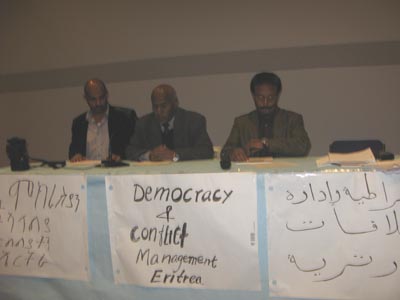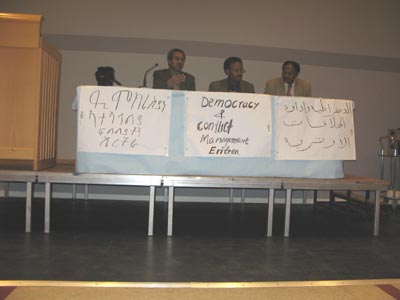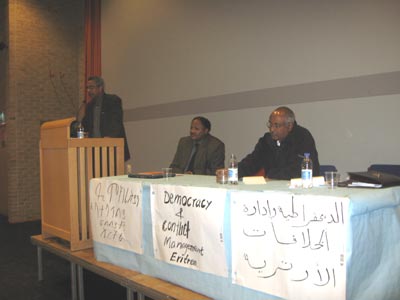Stockholm’s
three day conference final report

By
organizers
The
three day conference organized by the Eritrean Association for peace and
democracy where all Eritrean opposition civil, political and friendly Swedish
liberal party organizations participated was successfully completed on 4th
November 2007. The conference with its three programmes of work, thus evening
seminar on Friday 2nd November 2007, was opened by Ms Birgitta
Ohlsson member of the parliament and liberal party. The keynote speakers were
Dr. Johannes Zermariam and Fredrik Malm of the liberal party and member of the
parliament.

Dr.
Johannes and Fredrik Malm were the keynote speakers. Dr Johannes’s speech
focused more on the opposition democratic forces. He stressed that our
struggle is not simply to replace the dictator but to build democratic
institutions and democratic society. In his speech, Mr. Johannes has assessed
the situation and proposed an urgent choice of means that unite the forces for
democracy under one platform.
Mr.
Fredrik emphasized how important it is that Eritreans in diaspora stop their
support the dictator in Eritrea and stand with the opposition. He added that
the liberal party is working hard with its partners at the EU level to discuss
the issue of democracy in Eritrea.

After
lecture, panel discussion was conducted. The first question was about the
silent diplomacy followed by the EU member countries with the dictators and
its effect. Dr. Yohannes replied that silent diplomacy is not the correct way
to approach dictators but to openly criticize and exert hard pressure on it.
The other questions were how the opposition come together and influence the
international opinion towards the Eritrean case.
At
the meeting human rights document and a proposal paper to be discussed on the
Swedish parliament and further at the EU level were were distributed.
The
2nd day conference in
the city of Stockholm was a whole day conference participated by civil and
political opposition organizations and support and friendly Swedish liberal
party members. The seminar was opened by Mr. Ibrahim Abdallah, the head of the
Eritrean Association for peace and democracy.
In
his welcome speech; he has briefed the horrible situation of the Eritrean
people under the inhumane and oppressive regime. He welcomed the invited guest
speakers – Dr. Sahle Tesfai , Fredrik Malm of the liberal party and Dr.
Yohannes Zermariam.
The
seminar was chaired by Mr. Arhe Hamednaca, a member of the association. The
first speaker was Dr. Sahle Tesfai.
Dr.
Sahle Tesfai presented his paper under the title, “ Dialogue towards
national conference”.
The
core issues of his discussion were on Unity, Reconciliation and National
Conference. He elaborated the historical trials and fails of uniting the
Eritrean politic during the political, armed and even after the independence
of the country. He criticised block building and underlined such block
buildings does not lead us to
converge but fragmentation and increasing fractions confronting each other in
opposing directions.
The
second speaker was Mr. Fredrik Malm of the liberal party and member of the
Swedish parliament. Mr. Fredrik introduced his speech how he was come to know
Eritrea during the liberation period and how his party was engaged to support
the Eritrean people after independence but after independence the fate of the
Eritrea people become dark and all hopes for development were curtailed. He
mentioned the case of Dawit Isaak but added that it is not only Dawit’s case
but the whole human rights abuses that concern his party.
Democracy
is not only the rule by the people but it is the best system to resolve
conflicts without violence. Mr. Fredrik elaborated the human rights abuses in
the authoritarian states in the world and how they affect each other. He has
exemplified the internal and external conflicts in the Horn of Africa and
their interdependence.
He
quoted the words of Voltiare,” Even if I don’t agree with your opinion I
will die defending your opinion” is one of the democratic values that we
must respect.
After
two speeches the seminar has taken a 40 minutes lunch break.
Later
after break, the third speaker was Dr. Yohannes Zermariam. He presented his
paper under the title, “ Democracy and conflict processing in Eritrea..”
His paper focused on democracy as
the method of conflict management. He proceeded
that our task as opposition is not only to replace the dictator but
build viable democracy with functioning institutions and forums of consensus.
He added that this needs mechanisms or frameworks carrying the political
process of the opposition towards a capable alternative to the dictator in
Eritrea.

Panel
discussions
Questions
raised by the audience:
1.
How can we attract the youth, women, civil societies and religious
leaders?
2.
How can you identify between civil society and political organization?
3.
Why do you oppose always the regime in Eritrea?
4.
What do you mean by ignorance of unity?
5.
How can we overcome this ignorance?
6.
Was alliance- building in the opposition political organizations
tactical or strategic?
7.
What is the difference between strategy and tactic?
8.
What do you think the mechanism that can unite the opposition political
organizations?
9.
What are the cleavages of the opposition political organizations?
Answers:
1.
In order to attract these sectors of our societies, organizations must
engage in regular dialogue, consultations and information exchange between
them. Joint activities of discussion, debate should be encouraged.
2.
It is difficult to identify at this time which is which, there is
overlap in membership between political parties and civil society but all
struggle for democratic changes, therefore no need to dispute.
3.
Because, it failed to accomplish its promises and put the people under
its control without no mandate from the people.
4.
By ignorance of unity , I mean that we are still not aware how
important is unity to peaceful coexistence and building a nation that respects
the fundamental rights of its citizens.( Dr. Sahle)
5.
We can overcome this by civic education and other democratic methods.
6.
The terms strategic and tactic are complicated and are used
intermittently without clear definitions, but tactic is the method used to
achieve short term goals while strategy is the method used to achieve long
term objectives. I think alliance building from time of the second world war and up to now has been practised by long
term objectives, for example, the countries who won the second world war built
alliance and after developed this method further to a union so called today
European Union. If the alliance of the Eritrean opposition was based on this
principles- thus first allied to win the dictator and later their long term to
build democratic Eritrea, therefore it is a strategic but if it is only to win
the dictator and then split, then is tactical.
7.
The difference is from the user and what he has for aims and goals.
They are different. Tactics are method used to win a short term aim and
strategy has vision and long term objectives to achieve.
8.
The only method to bring the various opposition political and civil
society organizations is dialogue.
9.
The characteristics of the organizations either political or civil is
by identities( ethnic,religious, regional and tribal) even those who call
themselves as organizations representing all seems dubious but practically if
we see them all are of the same shape, this is because there is no an umbrella
organization that unite them, respecting their fundamental rights.
The third day was a workshop:
The
workshop was opened by the project leader of the association, Mr. Fesseha Nair
and was attended by about 30 people from members and representatives of the
opposition political parties, organizations, movements, and civil societies.
The
first session was devoted to group discussions organized around 5 key
questions. There were two groups headed by Dr. Yohannes and Dr. Shale
respectively.
The
key questions were as follows below:
Democracy
Workshop key questions
1.
How do we identify factors that:
-
hinder
-
enhance
Unity
of the opposition camp?
2.
How do we create an inclusive democratic transition framework in the
opposition camp?
-
Experience
of Codesa( Convention democracy South Africa)
-
Experience
of Eritrean Democratic Alliance
-
Burmese
Coalition for unity and democracy
3.
How can national conference promote democratic transition in Eritrea?
4.
What is the role of the civil society in the struggle from dictatorship
to democracy?
5.
What should be the role of the media and its strategy for raising
democratic awareness?
-
Experience
of TV Zete and TV Adal in Sweden
-
Internet and
other media channels like satellite TV.
-
Experience
of IDASA- institute for a democratic alternative South Africa.
When
each group have discussed the key questions, then they come with different
findings and presented their findings to the participants together. The
results of the work shop will be reported lately in Arabic and Tigrinya.
The
three day conference was attended by 150 persons from the following political
and civic societies:
Political
organizations.
1.
ELF( Eritrean Liberation Front)
2.
ELF-RC ( Eritrean Liberation Front –Revolutionary Council)
3.
ENSF ( Eritrean National Salvation Front)
4.
EFDM ( Eritrean Federal Demopcratic Movement)
5.
EPDF ( Eritrean Peoples Democratic Front)
6.
EPM ( Eritrean Popular Movement)
7.
EIPJD ( Eritrean Islamic Party for Justice and development)
8.
ECP ( Eritrean congress party)
9.
Alnahda partiet
Civic
societies:
1.
EFD (Eritreansk folk rörelse för demokrati)
2.
EFFD ( Eritreansk förening för fred och demokrati)
3.
ENLF ( Eritreanks nationell league för forsoning)
4.
EDHR ( Eritrean for democracy and human rights)
The
conference was a success and come out with common understanding that must be
further developed and finally recommended that a memo based on this common
understanding they have reached, should submitted to all political
organizations leaders in the opposition camp.
The
memo is under preparation and will be sent to all political leaders of the
political and civic organizations.
The
papers presented by Dr. Yohannes and Dr. Sahle Tesfai will be published
separately soon.
Reports written by the info project group/ EAPD